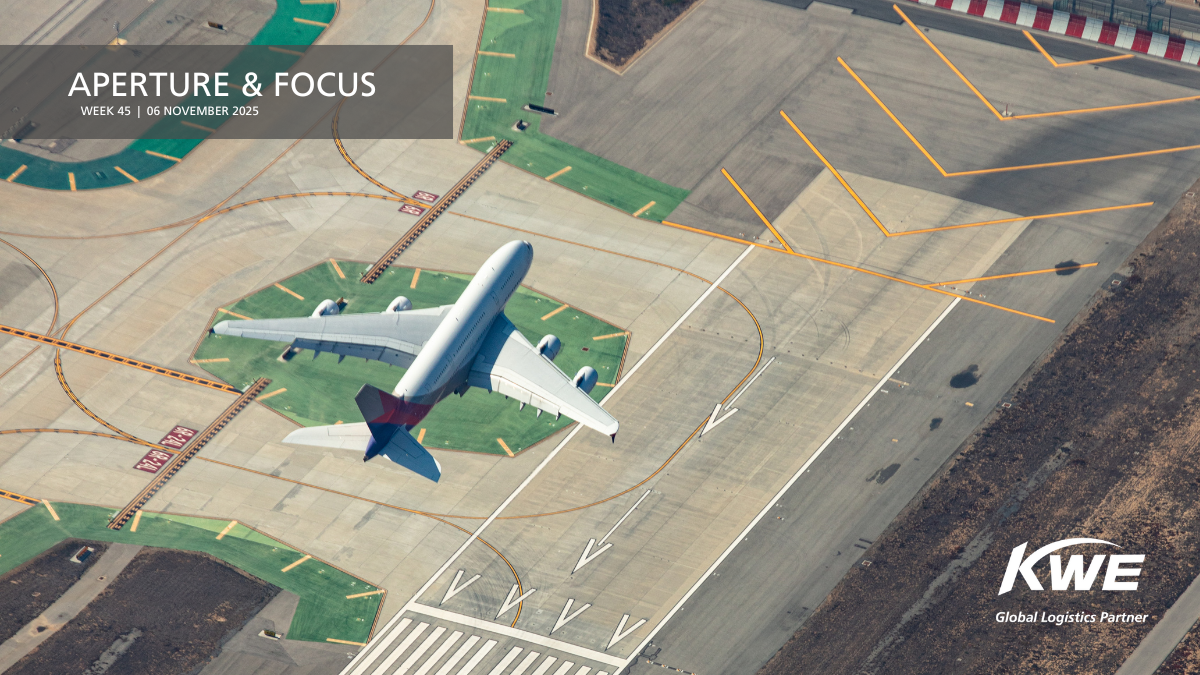Quote
Aperture & Focus 2025: Week 45

Global Aperture
A one-year suspension of reciprocal port fees between the United States and China will begin on November 10th, as part of a new trade agreement between Presidents Donald Trump and Xi Jinping. The deal includes China’s pledge to purchase at least 12 million tons of U.S. soybeans by year-end and 25 million tons annually through 2028, a move expected to boost bulk shipping activity.
Global air cargo volumes rose +4% year-on-year during the month of October, surpassing expectations despite tariff-related disruptions and the U.S. de minimis import ban, which prohibits goods valued under $800 from entering the country duty-free. However, analysts warn that a -6% decline in Europe–North America traffic may signal a broader slowdown in global trade, as capacity growth outpaces demand, and forwarders increasingly focus on cost control heading into 2026.
Regional Focus
Americas
United States: The United States Department of Transportation announced plans to reduce airline traffic by up to 10% at 40 major airports starting November 7th if the government shutdown continues. The shutdown, which began on October 1st, has left thousands of Federal Aviation Administration and Transportation Security Administration employees unpaid or furloughed, creating safety and staffing challenges. The phased reductions will affect passenger, private, and cargo flights, marking the first nationwide capacity cut of its kind as the Federal Aviation Administration works to ease operational strain.
Weakened demand and tariff pressures were among factors that saw third-quarter truck freight volumes fall 2.9% from the previous quarter according to the latest Freight Payment Index report from freight audit and payment provider U.S. Bank. While freight activity increased in the Northeast and West, the Southwest, Midwest, and Southeast saw declines.
U.S. rail freight fell 3.9% in the week ending November 1st, with intermodal traffic down 6.4% year-over-year—a continued decline, according to the Association of American Railroads. Economic uncertainty and weaker consumer spending reduced demand for vehicles and forest products, while earlier tariff-driven import slowdowns shifted some strength to domestic rail traffic.
Asia-Pacific
The Association of Asia Pacific Airlines reported that air cargo demand in the Asia Pacific region grew 5.0% year-on-year in September, supported by export front-loading and adjustments to U.S trade policies. Freight capacity increased 4.4%, while load factors remained steady at 60.8%, reflecting resilient cargo activity amid ongoing supply chain constraints.
Singapore / South Korea: Singapore and the Republic of Korea signed a Memorandum of Understanding on November 2 to create a Green and Digital Shipping Corridor. The partnership will focus on developing bunkering infrastructure for supplying low-emission fuels, aligning technical standards, and advancing digitalization.
South Korea / Germany: Air connectivity between Seoul’s Incheon International Airport (ICN) and major German cities has been renewed through a partnership between Korean Air and Condor Airlines. The partnership expands flight frequency and regional reach, which may increase available belly hold cargo capacity and support stronger economic and tourism activity across Europe’s key markets.
Philippines: The Civil Aviation Authority of the Philippines reported only minor structural damage at several regional airports affected by Typhoon Tino. All ten international airports under the authority’s supervision, including Manila’s Ninoy Aquino International Airport (MNL) and Mactan-Cebu International Airport (CEB), remained fully operational, minimizing disruptions to air transport and logistics services.
Europe, Middle East & Africa
European Union: The European Commission introduced the Sustainable Transport Investment Plan to boost renewable and low-carbon fuel production for shipping and aviation. The initiative aims to reduce reliance on fossil fuels and strengthen Europe’s competitiveness in sustainable transport and maritime logistics.
Belgium: Brussels Airport (BRU) is strengthening its role as a global hub for advanced pharmaceutical logistics. Through Air Cargo Belgium, the airport is fostering collaboration between manufacturers and logistics providers to develop efficient, patient-focused solutions for transporting temperature-sensitive cargo.